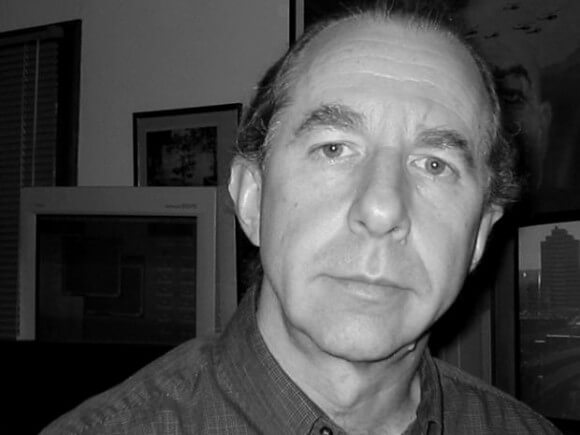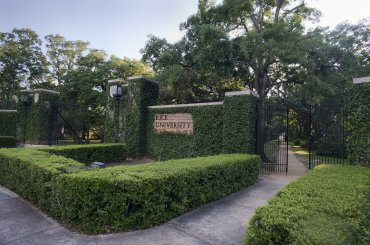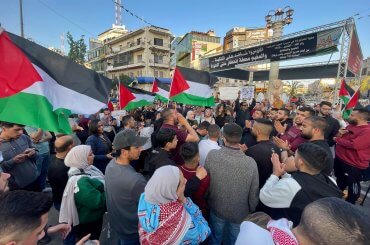Jewish Voice for Peace is showing the documentary Two Blue Lines tonight, Friday March 13, 9:30-11:00 PM, Constellation B, at its National Membership Meeting.
At the premiere of his documentary Two Blue Lines last month in Ohio, Tom Hayes left talk for later, letting his film on the Israeli debate over Palestine sing out for itself. And it did, to horror, laughter, tears, and–finally–cheers from the audience of 160-plus at what’s censored by the dominant U.S. press: Israelis debating their government’s illegal Occupation of Palestine. Clips of messianic Zionists justifying their right to steal “territory returned by God” intersperse those of activists with conscience, who–pained at Palestinians’ torment under tyranny in “their land!”–work for equality throughout historic Palestine.
Afterward, Hayes rose to thank us and those who’d helped him film, including co-producers Riad Bahhur and Dori Ridgeway. Hayes averred that the most important contributions came from “people I can’t thank, because they live under the sword of Administrative Detention by the Israeli Defense Forces.” He had told me earlier that he “could no longer live with the guilt of getting people shot or imprisoned.”
Hayes asked, “Why would a citizen of the planet, a mongrel–not Israeli or Palestinian–but a long-haired, over-fed, leaping gnome like me [actually, nothing like Hayes except for the hair] fixate on freeing Palestine?” Hayes told of his epiphany about the refugee camps one April morning in 1981:
“A chrysalis of mirrors had been created around the Palestinian people; a construct had been manufactured in my mind to remove a section of humanity from humanity: just obliterate an entire group of people, simply because of their land of origin.”
Hayes was fascinated by this persecution of Palestinians, because he had made a film about refugee camps on the Cambodian border, but “No one threatened my funding or phoned in bomb threats to the theater or my house.” He could hardly believe the madness: “This is Columbus, Ohio, not [Occupied] Ramallah.” Outrage inspired Hayes to keep on plugging after his first film Native Sons: Palestinians In Exile, narrated by Martin Sheen, and again after his next, People and The Land.
Moreover, “on every return to Palestine, I found the lives of the Palestinian people more crushed.”
*****
Tom Hayes turned from his own views to ask the audience ours. I list the approximate questions with his answers:
–“I’m Palestinian and want to say ‘Thank you,’ for your sacrifices, and to ask about the meaning of the title, Two Blue Lines.” Tom touched on the possibilities, “The lines on the Israeli flag”; “Palestinians live within an Israel cage”; “the two lines also equal an equals sign.” He added, “Equality definitely has the blues if you’re in Palestine.” The audience laughed agreement.
–“What do you think about Senator John Boehner inviting Netanyahu to address a joint session of Congress?” Tom retorted, “I wish every politician would spend a day in Gaza City.”
–“Do you see the American influence being undone?,” Tom said, “Yes, the power of the lobby is dissipating,” and he hoped that his film would help.
–“What about the ‘two-state solution?’ Palestine isn’t there anymore: it’s already gone.” Tom described how, though we’re witnessing change around the world, including Obama’s opening to Cuba, many are still “‘PEP’–Progressive except on Palestine.” But, “Palestine lives in every Palestinian. It’s a living culture. Placing a piece of contact paper over that culture doesn’t negate that culture.”
That glowing insight, reminding us of Palestine’s “sumud,” inspired the hall.
–“How can we help [….what to do about the U.S. military in the Middle East]?” “You don’t treat measles with make-up. A violent response to a genocidal project isn’t going to stop anything.”
–“Why did the film premiere on the 70th anniversary of the liberation of Auschwitz?” The Wexner Manager interjected: showing it on that anniversary was unintentional: this was the day that fit the Center’s schedule.
–“How do Israeli Jews respond?” “There’s a fragrance of questions enveloping young people like Tomir in the film: ‘What’s up with all this?’ But many people cannot see Palestinians as human beings.”
–“What about Michael Moore?” Hayes quipped, “Michael’s not answering my calls–yet.” We listeners chuckled. “In 1989, he was thinking of doing a film during the first uprising. So I don’t think he’s PEP.”
–“Can you say why our government is so blind and so supportive of this horrible regime [of Israel’s Occupation of Palestine]?” “The short answer is, ‘No.’ I can’t understand politicians. They talk of freedom, justice. Yet the number-one foreign aid recipient is ‘George Wallace,'”–that is, “segregation. Yesh Din tracks discriminatory laws that privilege Jews inside Israel. Jerusalem is Occupied territory.”
Hayes summed up: “Not one Palestinian living under Israeli rule is treated as a human being–not one.” That’s why he hopes his documentary “will shatter the monolithic image of Israel: it is not just one thing, for it includes dynamic, empathic people working for human rights.”
–“Religion is complex: for change to happen, we need leaders who want to change, who come from the Jewish community. Who do you see who can do that change? Where are the Palestinian leaders willing to reach out to the Jewish community….?” “[The late] Samiha Khalil, who ran against Chairman Arafat and would have been great. Mahmoud Abbas and his gang remind me of the ‘hang-around-the-fort [Native Americans]’ during the last Indian wars.”
Samiha Khalil is one of the leaders to whom Tom dedicated Two Blue Lines–along with the two murdered greats, Alex Odeh and Rachel Corrie.
–“For whom did you make this film?” “”Any filmmaker makes movies for himself first. The Israeli forces were not keen on anyone filming what they’re doing. So I filmed burning-cross-on-the-lawn settlers and interesting Israelis. The film climbed out of all this pile of footage.”
Hayes recounted how, when he wanted to make his film, Native Sons: Palestinians in Exile, he asked the late Edward Said for advice. Said responded, “It’s nice that you noticed, but we Palestinians need to tell our own stories.” So “I had a crisis about turning the film over to Israelis.” But he soon realized that a film of dueling Israelis–fundamentalism contrasted with dreams of equal citizenship for all–could help change U.S. policy, because:
“Americans can’t hear Palestinians. When their mouths move, most in the U.S, hear silence. Perhaps when nice Jewish people are telling the story, Americans will listen.”
But another jubilant standing ovation showed how many Americans long to hear from the people of Palestine, too.
For more of the Tom Hayes’s fascinating visions of Palestine, enjoy his tales of filming and broadcasting in “The Information Blockade: The Prism between Middle Eastern reality and Americans.”
Register for a Virtual Pass to JVP online events.
And see the trailer for Two Blue Lines here.



Huge thanks for this great article and the Q&A, Susie!
3 things jumped out at me:
“on every return to Palestine, I found the lives of the Palestinian people more crushed.”
—–
“Palestine lives in every Palestinian. It’s a living culture.”
—–
Said: “It’s nice that you noticed, but we Palestinians need to tell our own stories.”
—–
And of course, this:
““Americans can’t hear Palestinians. When their mouths move, most in the U.S, hear silence. Perhaps when nice Jewish people are telling the story, Americans will listen.”
But another jubilant standing ovation showed how many Americans long to hear from the people of Palestine, too.”
Wonderful!
thanks for a great report susie. of course i had to go watch the vimeo trailor you posted in your first article again. such a powerful short. i’d love to see this film. thank you!
Thanks to You Both, ever Wonderful!
(And just checked to make sure I’d stuck in the link here, too, Annie: it’s in the last line, but invisible.)
Thanks for All: you’re both doing such great work.
The fact that this information about the people in Palestine is, for all practical purposes, COMPLETELY absent from the mainstream media in the western democracies cannot be random chance. It can ONLY mean that the mainstream media is tightly controlled by people who want this information buried. Among the collateral damages of the “Zionist project” has been the crushing of the free press. Reporters and commentators with the Israeli choke collar around their necks must feel very frustrated. Kind of like being a reporter in the Soviet Union, with the main newspaper called “Truth”.
“What about Michael Moore?” Hayes quipped, “Michael’s not answering my calls–yet.” We listeners chuckled. “In 1989, he was thinking of doing a film during the first uprising. So I don’t think he’s PEP.”
Moore hosted the guy who did Five Broken Cameras. I don’t know how “liberal” his views are but he’s definitely not PEP.